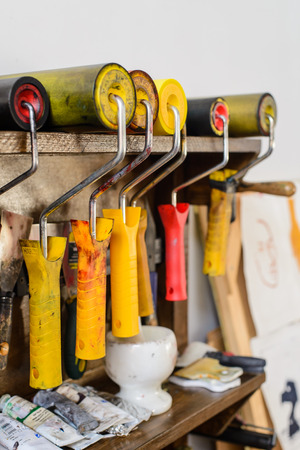1. Dont Skip Attending the Inspection
When youre buying a home, its easy to think that you can just wait for the inspection report and review it later. But physically being at the home inspection is incredibly valuable. It gives you the chance to see potential issues with your own eyes, ask the inspector questions in real time, and get a much better sense of what shape the house is really in.
Home inspectors are trained to spot things you might overlook—like signs of water damage, outdated wiring, or structural concerns. Seeing these problems firsthand helps you understand their seriousness and whether they’re worth negotiating over or walking away from altogether.
Why You Should Be There
| Reason | Benefit |
|---|---|
| Ask Questions On the Spot | You can get immediate answers instead of trying to interpret technical terms in a report later. |
| See Issues Firsthand | Helps you understand how serious a problem might be. |
| Learn About Home Maintenance | The inspector may point out helpful tips about maintaining different systems in the home. |
| Gauge Overall Condition | You’ll get a clearer picture of how well the home has been taken care of. |
Common Mistake: Relying Only on the Report
Inspection reports are useful, but they don’t always tell the full story. Some findings may seem alarming when written down but are actually minor. Others might look small on paper but feel more significant when you see them up close. Being there gives context that you just cant get from reading a document.
Helpful Tip:
If you can’t attend in person, ask if the inspector can do a video call while walking through the property with you. Its not as ideal, but its much better than skipping it altogether.
2. Dont Bring a Big Entourage
It might be tempting to invite your parents, friends, or even future roommates to the home inspection, especially if youre excited about the property. But when it comes to inspections, less is more. Having too many people around can distract the inspector from doing their job thoroughly and efficiently. It can also make sellers uncomfortable if they’re still living in the home.
The best practice? Keep your group small—ideally just you and your real estate agent. This allows the inspector to focus on identifying potential issues without interruptions, and gives you a better chance to ask questions and take notes without feeling rushed or distracted.
Why Keeping the Group Small Matters
| Reason | Impact of Bringing Too Many People | Benefit of a Small Group |
|---|---|---|
| Inspector Focus | Too many conversations and movements can cause distractions. | The inspector can concentrate fully on checking every detail. |
| Sellers Comfort | A large group may feel intrusive or disrespectful to sellers. | A smaller group shows professionalism and respect for the space. |
| Your Experience | You might miss important information while managing others. | You get more one-on-one time with the inspector and agent. |
Remember, the home inspection is a critical step in the buying process. Treat it as an opportunity to learn everything you can about your potential new home—without unnecessary distractions.

3. Dont Interrupt the Inspector Constantly
While its completely normal to be curious and want to ask questions during your home inspection, its important not to disrupt the inspector’s flow. Home inspections involve a detailed process where the inspector needs time and focus to carefully evaluate every part of the home. Constant interruptions can lead to missed issues or an incomplete assessment.
Why It Matters
Your inspector is there to do a thorough job, often working off a checklist that covers hundreds of items. If you interrupt them too frequently, it can break their concentration or cause delays. Remember, many inspectors are on tight schedules and need to stick to a timeline.
Better Approach: Observe and Take Notes
Instead of stopping the inspector every few minutes, follow along quietly if they allow it. Bring a notebook or use your phone to jot down questions as they come up. Once the inspection is complete, youll have the opportunity to ask all your questions in one go.
Heres a simple comparison:
| What Not To Do | What To Do Instead |
|---|---|
| Interrupt the inspector every few minutes with questions | Observe quietly and save your questions for the end |
| Follow them too closely or peek over their shoulder | Maintain respectful distance and take notes |
| Attempt to direct their process or point out what to check next | Trust their expertise and let them follow their routine |
This approach not only shows respect for the inspector’s work but also ensures you get more thoughtful, detailed answers when they’re done. Plus, it makes the whole experience smoother and more productive for everyone involved.
4. Dont Ignore the Report
Once the home inspection is done, its tempting to just file the report away and move on—especially if youre excited about closing the deal. But ignoring this document can be a costly mistake. The inspection report isn’t just paperwork; it’s a valuable tool that gives you insights into the property’s condition and helps you make informed decisions.
Why the Report Matters
The inspectors report highlights current issues, potential future problems, and areas that may need maintenance. Skipping over these details could mean missing out on red flags that could cost you thousands of dollars down the line.
Use It as a Negotiation Tool
If the report reveals significant issues—like an aging roof or outdated electrical systems—you may have grounds to renegotiate with the seller. You can ask them to fix the problems before closing or adjust the price to cover repair costs.
Common Issues Found in Reports and Possible Actions
| Issue Found | Possible Action |
|---|---|
| Leaky roof | Request seller to repair or offer credit at closing |
| Old HVAC system | Negotiate replacement or budget for future upgrade |
| Plumbing concerns | Get a plumbers estimate and ask for price reduction |
| Mold or water damage | Request professional remediation before closing |
Plan for Future Maintenance
Not everything in the report needs immediate attention, but it can help you plan ahead. For example, if the water heater is functioning but near the end of its lifespan, you’ll know to set aside funds for a replacement soon.
Pro Tip:
Create a checklist from your inspection report so you can track what needs fixing now and what to monitor over time. This keeps you ahead of any surprises after move-in day.
5. Dont Expect Perfection
When youre buying a home, its important to keep in mind that no house is perfect — not even a brand-new one. Every property will have some issues, whether big or small. The key during a home inspection is to focus on the major concerns that could affect the safety, structure, or livability of the home, rather than getting caught up in minor cosmetic flaws.
Understand the Difference Between Major and Minor Issues
Home inspections often reveal a long list of findings, but that doesnt mean the house is falling apart. Its normal for inspectors to note everything from chipped paint to outdated outlets. Heres a simple breakdown:
| Type of Issue | Examples | Should You Worry? |
|---|---|---|
| Major Issues | Foundation cracks, roof leaks, electrical hazards, plumbing problems, mold, HVAC failure | Yes – these can be costly and affect safety or structure |
| Minor Issues | Peeling paint, old carpet, loose doorknobs, squeaky floors | No – these are mostly cosmetic and easy to fix later |
Avoid Overreacting to Small Defects
It’s easy to get overwhelmed when you see a long inspection report. But remember: inspectors are paid to find everything they can. A detailed report doesnt mean the home is a bad buy — it just means the inspector did their job well. Focus your energy on understanding any serious red flags and talk with your real estate agent about how to handle them.
Be Realistic With Your Expectations
If youre expecting a flawless house with zero repairs needed, you might end up disappointed or miss out on a great opportunity. Even newly built homes can have issues like settling cracks or appliance defects. Whats important is knowing what youre willing to take on and what youre not. Being realistic helps you make smarter decisions without unnecessary stress.


